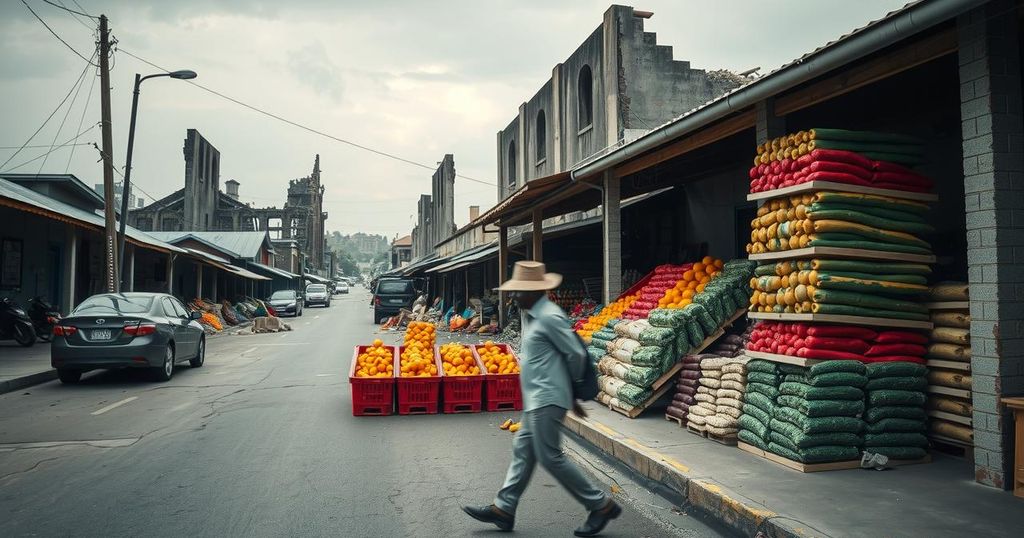Food prices in Goma have soared 18 to 160 percent following the M23 takeover. Supplies were disrupted by conflict, pushing many residents into severe hunger. Essential aid remains blocked, prompting concerns about widespread malnutrition, particularly among vulnerable populations. A recent ceasefire offers a potential path for humanitarian access, yet urgent action is still required to address the crisis.
Following the M23 rebel takeover of Goma, the main city in the eastern Democratic Republic of the Congo (DRC), food prices have surged dramatically. Essential food items now cost between 18 and 160 percent more, exacerbating an already critical situation for many residents. According to ActionAid, an NGO monitoring the situation, the crisis is pushing hundreds of thousands into severe hunger due to blocked supplies and escalating conflicts.
Reports indicate that the prices of staples such as flour, beans, and cooking oil have doubled. Locals expressed their discontent with the soaring costs, stating that access to basic nutrition has become increasingly unattainable. As aid organizations struggle to deliver assistance amid violence, the residents of Goma face a grave displacement and hunger crisis.
Since the January 26 takeover, conditions in Goma have changed dramatically, with intermittent fighting leading to disruptions in services. Although power and food supplies have somewhat resumed, prices remain prohibitively high. One mother lamented, “We buy various products at a high price, affecting us economically at this time of war.”
An anonymous community volunteer from ActionAid highlighted considerable price increases for food items, suggesting that the increase in cost is unsustainable for many families. Despite a slight decrease from the peak of the crisis, basic goods remain too expensive for most, forcing families to significantly reduce their meals.
More than 90 percent of Goma’s food comes from surrounding regions, but ongoing violence has disrupted transportation, leading to further shortages. The situation is dire, particularly for women and children, who face heightened risks of exploitation and malnutrition. Prior to the conflict, many were already struggling with food security, with millions facing crisis levels of hunger.
The World Food Programme has warned that millions of children and pregnant women are at risk of acute malnutrition. Moreover, prior to recent escalations, camps for displaced individuals were dependent on humanitarian aid, which has now been hindered, leaving countless families without essential support. ActionAid’s DRC country director underscored the urgent need for unimpeded access for humanitarian efforts amidst escalating conflicts.
In a recent development, the M23 rebels announced a ceasefire, stating that they would pause military actions for humanitarian reasons. However, the situation in Goma remains precarious, with many residents hoping for immediate assistance to alleviate their struggles.
Food insecurity in the Democratic Republic of the Congo is a pressing issue, exacerbated by ongoing conflicts such as the recent takeover of Goma by M23 rebels. The crisis impacts millions, particularly vulnerable populations like women and children, who are most at risk for malnutrition and exploitation. Prior to the recent violence, many individuals faced severe food security challenges, making the situation even more urgent following the escalation of conflict and the blockage of aid to the region.
In summary, the takeover of Goma by M23 rebels has drastically increased food prices, pushing many into severe food insecurity, as confirmed by local accounts and ActionAid reports. Blocked aid and ongoing violence have further complicated the humanitarian crisis, necessitating immediate action from all parties to restore access to much-needed support. The ceasefire declared by the M23 offers a glimmer of hope, yet the situation remains critical for Goma’s residents.
Original Source: www.aljazeera.com




